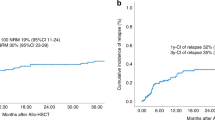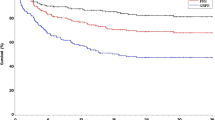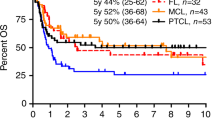Abstract
Allogeneic hematopoietic cell transplantation (alloHCT) remains a valuable treatment alternative for relapsed/refractory (R/R) Hodgkin lymphoma (HL). Data on alloHCT outcomes in the era of new HL therapies are needed. We evaluated 72R/R HL patients who received reduced intensity conditioning alloHCT and compared the time periods 2009–2013 (n=20) with 2000–2008 (n=52). Grafts included HLA-matched sibling (35%), unrelated donor (8%) and umbilical cord blood (56%). In the recent period, patients more often received brentuximab vedotin (BV, 60% vs 2%), had fewer comorbidities (Sorror index 0: 60% vs 12%) and were in complete remission (50% vs 23%). Median follow-up was 4.4 years. Three-year PFS improved for patients treated between 2009 and 2013 (49%, 95% CI 26–68%) as compared with the earlier era (23%, 95% CI 13–35%, P=0.02). Overall survival (OS) at 3 years was 84% (95% CI 57–94%) vs 50% (95% CI 36–62%, P=0.01), reflecting lower non-relapse mortality and relapse rates. In multivariate analysis mortality was higher among those with chemoresistance (HR 3.83, 95% CI 1.38–10.57), while treatment during the recent era was associated with better OS (HR for period 2009–2013: 0.24, 95% CI 0.07–0.79) and PFS (HR 0.46, 95% CI 0.23–0.92). AlloHCT in patients with R/R HL is now a more effective treatment than previously.
This is a preview of subscription content, access via your institution
Access options
Subscribe to this journal
Receive 12 print issues and online access
$259.00 per year
only $21.58 per issue
Buy this article
- Purchase on Springer Link
- Instant access to full article PDF
Prices may be subject to local taxes which are calculated during checkout

Similar content being viewed by others
References
Ansell SM . Hodgkin lymphoma: 2014 update on diagnosis, risk-stratification, and management. Am J Hematol 2014; 89: 771–779.
Canellos GP, Niedzwiecki D . Long-term follow-up of Hodgkin's disease trial. N Engl J Med 2002; 346: 1417–1418.
Majhail NS, Weisdorf DJ, Defor TE, Miller JS, McGlave PB, Slungaard A et al. Long-term results of autologous stem cell transplantation for primary refractory or relapsed Hodgkin's lymphoma. Biol Blood Marrow Transplant 2006; 12: 1065–1072.
Schmitz N, Pfistner B, Sextro M, Sieber M, Carella AM, Haenel M et al. Aggressive conventional chemotherapy compared with high-dose chemotherapy with autologous haemopoietic stem-cell transplantation for relapsed chemosensitive Hodgkin's disease: a randomised trial. Lancet 2002; 359: 2065–2071.
Gopal AK, Metcalfe TL, Gooley TA, Pagel JM, Petersdorf SH, Bensinger WI et al. High-dose therapy and autologous stem cell transplantation for chemoresistant Hodgkin lymphoma: the Seattle experience. Cancer 2008; 113: 1344–1350.
Moskowitz AJ, Perales MA, Kewalramani T, Yahalom J, Castro-Malaspina H, Zhang Z et al. Outcomes for patients who fail high dose chemoradiotherapy and autologous stem cell rescue for relapsed and primary refractory Hodgkin lymphoma. Br J Haematol 2009; 146: 158–163.
Arai S, Fanale M, DeVos S, Engert A, Illidge T, Borchmann P et al. Defining a Hodgkin lymphoma population for novel therapeutics after relapse from autologous hematopoietic cell transplant. Leuk Lymphoma 2013; 54: 2531–2533.
Sureda A, Constans M, Iriondo A, Arranz R, Caballero MD, Vidal MJ et al. Prognostic factors affecting long-term outcome after stem cell transplantation in Hodgkin's lymphoma autografted after a first relapse. Ann Oncol 2005; 16: 625–633.
Champlin R, Khouri I, Komblau S, Molidrem J, Giralt S . Reinventing bone marrow transplantation. Nonmyeloablative preparative regimens and induction of graft-vs-malignancy effect. Oncology (Williston Park) 1999; 13: 621–628.
Martino M, Festuccia M, Fedele R, Console G, Cimminiello M, Gavarotti P et al. Salvage treatment for relapsed/refractory hodgkin lymphoma: role of allografting, brentuximab vedotin and newer agents. Expert Opin Biol Ther 2016; 16: 347–364.
Gajewski JL, Phillips GL, Sobocinski KA, Armitage JO, Gale RP, Champlin RE et al. Bone marrow transplants from HLA-identical siblings in advanced Hodgkin's disease. J Clin Oncol 1996; 14: 572–578.
Peggs KS, Sureda A, Qian W, Caballero D, Hunter A, Urbano-Ispizua A et al. Reduced-intensity conditioning for allogeneic haematopoietic stem cell transplantation in relapsed and refractory Hodgkin lymphoma: impact of alemtuzumab and donor lymphocyte infusions on long-term outcomes. Br J Haematol 2007; 139: 70–80.
de Claro RA, McGinn K, Kwitkowski V, Bullock J, Khandelwal A, Habtemariam B et al. U.S. Food and Drug Administration approval summary: brentuximab vedotin for the treatment of relapsed Hodgkin lymphoma or relapsed systemic anaplastic large-cell lymphoma. Clin Cancer Res 2012; 18: 5845–5849.
Younes A, Gopal AK, Smith SE, Ansell SM, Rosenblatt JD, Savage KJ et al. Results of a pivotal phase II study of brentuximab vedotin for patients with relapsed or refractory Hodgkin's lymphoma. J Clin Oncol 2012; 30: 2183–2189.
Robinson SP, Sureda A, Canals C, Russell N, Caballero D, Bacigalupo A et al. Reduced intensity conditioning allogeneic stem cell transplantation for Hodgkin's lymphoma: identification of prognostic factors predicting outcome. Haematologica 2009; 94: 230–238.
Sureda A, Robinson S, Canals C, Carella AM, Boogaerts MA, Caballero D et al. Reduced-intensity conditioning compared with conventional allogeneic stem-cell transplantation in relapsed or refractory Hodgkin's lymphoma: an analysis from the Lymphoma Working Party of the European Group for Blood and Marrow Transplantation. J Clin Oncol 2008; 26: 455–462.
Armand P, Kim HT, Cutler CS, Ho VT, Koreth J, Ritz J et al. A prognostic score for patients with acute leukemia or myelodysplastic syndromes undergoing allogeneic stem cell transplantation. Biol Blood Marrow Transplant 2008; 14: 28–35.
Bejanyan N, Rogosheske J, DeFor T, Lazaryan A, Esbaum K, Holtan S et al. Higher dose of mycophenolate mofetil reduces acute graft-versus-host disease in reduced-intensity conditioning double umbilical cord blood transplantation. Biol Blood Marrow Transplant 2015; 21: 926–933.
Sorror ML, Maris MB, Storb R, Baron F, Sandmaier BM, Maloney DG et al. Hematopoietic cell transplantation (HCT)-specific comorbidity index: a new tool for risk assessment before allogeneic HCT. Blood 2005; 106: 2912–2919.
Shulman HM, Kleiner D, Lee SJ, Morton T, Pavletic SZ, Farmer E et al. Histopathologic diagnosis of chronic graft-versus-host disease: National Institutes of Health Consensus Development Project on Criteria for Clinical Trials in Chronic Graft-versus-Host Disease: II. Pathology Working Group Report. Biol Blood Marrow Transplant 2006; 12: 31–47.
Filipovich AH, Weisdorf D, Pavletic S, Socie G, Wingard JR, Lee SJ et al. National Institutes of Health consensus development project on criteria for clinical trials in chronic graft-versus-host disease: I. Diagnosis and staging working group report. Biol Blood Marrow Transplant 2005; 11: 945–956.
Cheson BD, Pfistner B, Juweid ME, Gascoyne RD, Specht L, Horning SJ et al. Revised response criteria for malignant lymphoma. J Clin Oncol 2007; 25: 579–586.
Kaplan EL, Meier P . Nonparametric-estimation from incomplete observations. J Am Stat Assoc 1958; 53: 457–481.
Lin DY . Non-parametric inference for cumulative incidence functions in competing risks studies. Stat Med 1997; 16: 901–910.
Fine JP, Gray . A proportional hazards model for the subdistribution of a competing risk. J Am Stat Assoc 1999; 94: 496–509.
Sarina B, Castagna L, Farina L, Patriarca F, Benedetti F, Carella AM et al. Allogeneic transplantation improves the overall and progression-free survival of Hodgkin lymphoma patients relapsing after autologous transplantation: a retrospective study based on the time of HLA typing and donor availability. Blood 2010; 115: 3671–3677.
Burroughs LM, O'Donnell PV, Sandmaier BM, Storer BE, Luznik L, Symons HJ et al. Comparison of outcomes of HLA-matched related, unrelated, or HLA-haploidentical related hematopoietic cell transplantation following nonmyeloablative conditioning for relapsed or refractory Hodgkin lymphoma. Biol Blood Marrow Transplant 2008; 14: 1279–1287.
Armand P, Kim HT, Ho VT, Cutler CS, Koreth J, Antin JH et al. Allogeneic transplantation with reduced-intensity conditioning for Hodgkin and non-Hodgkin lymphoma: importance of histology for outcome. Biol Blood Marrow Transplant 2008; 14: 418–425.
Anderlini P, Saliba R, Acholonu S, Giralt SA, Andersson B, Ueno NT et al. Fludarabine-melphalan as a preparative regimen for reduced-intensity conditioning allogeneic stem cell transplantation in relapsed and refractory Hodgkin's lymphoma: the updated M.D. Anderson Cancer Center experience. Haematologica 2008; 93: 257–264.
Alvarez I, Sureda A, Caballero MD, Urbano-Ispizua A, Ribera JM, Canales M et al. Nonmyeloablative stem cell transplantation is an effective therapy for refractory or relapsed hodgkin lymphoma: results of a Spanish prospective cooperative protocol. Biol Blood Marrow Transplant 2006; 12: 172–183.
Anderlini P, Saliba R, Acholonu S, Okoroji GJ, Donato M, Giralt S et al. Reduced-intensity allogeneic stem cell transplantation in relapsed and refractory Hodgkin's disease: low transplant-related mortality and impact of intensity of conditioning regimen. Bone Marrow Transplant 2005; 35: 943–951.
Corradini P, Dodero A, Farina L, Fanin R, Patriarca F, Miceli R et al. Allogeneic stem cell transplantation following reduced-intensity conditioning can induce durable clinical and molecular remissions in relapsed lymphomas: pre-transplant disease status and histotype heavily influence outcome. Leukemia 2007; 21: 2316–2323.
Devetten MP, Hari PN, Carreras J, Logan BR, van Besien K, Bredeson CN et al. Unrelated donor reduced-intensity allogeneic hematopoietic stem cell transplantation for relapsed and refractory Hodgkin lymphoma. Biol Blood Marrow Transplant 2009; 15: 109–117.
Majhail NS, Weisdorf DJ, Wagner JE, Defor TE, Brunstein CG, Burns LJ . Comparable results of umbilical cord blood and HLA-matched sibling donor hematopoietic stem cell transplantation after reduced-intensity preparative regimen for advanced Hodgkin lymphoma. Blood 2006; 107: 3804–3807.
Peggs KS, Hunter A, Chopra R, Parker A, Mahendra P, Milligan D et al. Clinical evidence of a graft-versus-Hodgkin's-lymphoma effect after reduced-intensity allogeneic transplantation. Lancet 2005; 365: 1934–1941.
Chen R, Palmer JM, Tsai NC, Thomas SH, Siddiqi T, Popplewell L et al. Brentuximab vedotin is associated with improved progression-free survival after allogeneic transplantation for Hodgkin lymphoma. Biol Blood Marrow Transplant 2014; 20: 1864–1868.
Thompson PA, Perera T, Marin D, Oran B, Popat U, Qazilbash M et al. Double umbilical cord blood transplant is effective therapy for relapsed or refractory Hodgkin lymphoma. Leuk Lymphoma 2016; 57: 1607–1615.
Pinana JL, Sanz J, Esquirol A, Martino R, Picardi A, Barba P et al. Umbilical cord blood transplantation in adults with advanced Hodgkin's disease: high incidence of post-transplant lymphoproliferative disease. Eur J Haematol 2016; 96: 128–135.
Blaes AH, Cao Q, Wagner JE, Young JA, Weisdorf DJ, Brunstein CG . Monitoring and preemptive rituximab therapy for Epstein-Barr virus reactivation after antithymocyte globulin containing nonmyeloablative conditioning for umbilical cord blood transplantation. Biol Blood Marrow Transplant 2010; 16: 287–291.
Bachanova V, Burns LJ, Wang T, Carreras J, Gale RP, Wiernik PH et al. Alternative donors extend transplantation for patients with lymphoma who lack an HLA matched donor. Bone Marrow Transplant 2015; 50: 197–203.
Messer M, Steinzen A, Vervolgyi E, Lerch C, Richter B, Dreger P et al. Unrelated and alternative donor allogeneic stem cell transplant in patients with relapsed or refractory Hodgkin lymphoma: a systematic review. Leuk Lymphoma 2014; 55: 296–306.
Moskowitz CH, Nademanee A, Masszi T, Agura E, Holowiecki J, Abidi MH et al. Brentuximab vedotin as consolidation therapy after autologous stem-cell transplantation in patients with Hodgkin's lymphoma at risk of relapse or progression (AETHERA): a randomised, double-blind, placebo-controlled, phase 3 trial. Lancet 2015; 385: 1853–1862.
Ansell SM, Lesokhin AM, Borrello I, Halwani A, Scott EC, Gutierrez M et al. PD-1 blockade with nivolumab in relapsed or refractory Hodgkin's lymphoma. N Engl J Med 2015; 372: 311–319.
Acknowledgements
We thank Michael Franklin for editorial support. Research reported in this publication was supported by the National Center for Advancing Translational Sciences of the National Institutes of Health Award Number UL1TR000114 (to VB). The content is solely the responsibility of the authors and does not necessarily represent the official views of the National Institutes of Health. This work was also supported in part by NIH P30 CA77598 utilizing the Biostatistics and informatics core, Masonic Cancer Center, University of Minnesota shared resource.
Author contributions
LH and VB contributed to the conception and design of the study and drafted the manuscript. LH, VB, QC and AL contributed to data analysis and interpretation. LH, QC, AL, BLM, DJW, CGB and VB reviewed and approved the final version.
Author information
Authors and Affiliations
Corresponding author
Ethics declarations
Competing interests
VB is a member of Seattle Genetics Advisory Board. The remaining authors declare no conflict of interests.
Rights and permissions
About this article
Cite this article
Hegerova, L., Cao, Q., Lazaryan, A. et al. Improving outcomes after allogeneic hematopoietic cell transplantation for Hodgkin lymphoma in the brentuximab vedotin era. Bone Marrow Transplant 52, 697–703 (2017). https://doi.org/10.1038/bmt.2016.357
Received:
Revised:
Accepted:
Published:
Issue Date:
DOI: https://doi.org/10.1038/bmt.2016.357
This article is cited by
-
Allogeneic hematopoietic stem cell transplantation for advanced mycosis fungoides and Sézary syndrome. An updated experience of the Lymphoma Working Party of the European Society for Blood and Marrow Transplantation
Bone Marrow Transplantation (2021)
-
Changes in patients population and characteristics of hematopoietic stem cell transplantation for relapsed/refractory Hodgkin lymphoma: an analysis of the Lymphoma Working Party of the EBMT
Bone Marrow Transplantation (2020)
-
Haploidentical stem cell transplantation for patients with lymphoma: a position statement from the Lymphoma Working Party-European Society for Blood and Marrow Transplantation
Bone Marrow Transplantation (2020)
-
Brentuximab vedotin prior to allogeneic stem cell transplantation increases survival in chemorefractory Hodgkin’s lymphoma patients
Annals of Hematology (2019)
-
Brentuximab vedotin as salvage treatment in Hodgkin lymphoma naïve transplant patients or failing ASCT: the real life experience of Rete Ematologica Pugliese (REP)
Annals of Hematology (2018)



